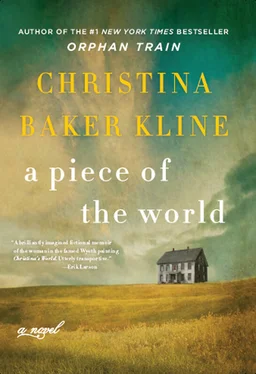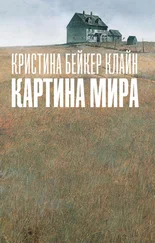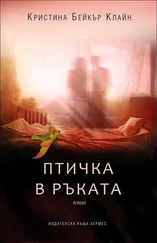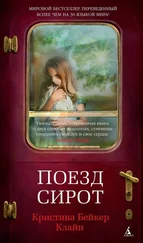As the letters pile up I save them under my bed, tied with a pale pink ribbon. In one he writes: “Every night I look up at the great square in the southeast, nearly overhead, and name the stars in it: Broad Cove, Four Corners, East Friendship, and the Ulmer Church, and wish that I were driving around it with you.” After supper I open the shed door and step outside, looking up at the vast expanse of stars, and imagine Walton doing the same in Cambridge. Here I am, there he is, connected by sky.
1944–1946
For years, nobody has seemed particularly interested in the young artist who set up a studio in our house. But this summer is different. In town with my sister-in-law, Mary, doing errands, I’m approached by a woman I don’t recognize in the canned-goods section of Fales.
“Excuse me. Are you . . . Christina Olson?”
I nod, puzzled. Why would a stranger know who I am?
“I thought so!” she beams. “I’m renting a cottage near here with my family for the week. I’ve read about you and your brother. Al, is it?”
Mary, who’d wandered over to the next aisle, comes around the corner. “Hello, I’m with Miss Olson. Can I help you?”
“Oh, I’m sorry! I should’ve cut to the chase. A famous painter is working at your home, I believe? Andrew Wyeth?”
“How do you—” Mary starts.
“I wonder if I might presume on you to get his autograph for me?” the woman wheedles.
“Oh. Well?” Mary asks, looking at me.
I give the woman a tight smile. “No, that’s impossible.”
Later, when I mention this to Betsy, she wags her head as if she’s not surprised. “Sorry about that, Christina. Andy was on the cover of American Artist a while back, and we worried it might change things. Evidently it has.”
“Did he say anything about Al and me?”
“A little. Not much. He may have mentioned your names. Of course the article reveals that he summers in Cushing, so it probably isn’t hard to figure out. I know he regrets saying anything. He really doesn’t like being bothered. I’m sure you don’t either.”
I shrug. I’m not sure how I feel about it.
Several weeks later, sitting in my chair beside the open kitchen window, I watch a baby blue convertible pull up in front of the house. The driver is wearing a cream fedora, the woman beside him a filmy polka-dotted head scarf.
“Toodle-oo!” she calls, waving pink-tipped fingers. “Hello! We’re looking for . . .” She bats the man on the arm. “What’s his name, honey?”
“Wyeth.”
“That’s right. Andrew Wyeth.” She gives me a pink-lipped smile through the window.
Andy isn’t here yet, but I know I’ll see him sauntering up the field from Kissing Cove any minute. “Never heard of him,” I tell her.
“He’s not painting inside this house?”
“Not last time I checked,” I say.
She purses her lips, perplexed. “Frank, isn’t this the place?”
“I don’t know.” He sighs. “You tell me.”
“I’m pretty sure. That magazine said so.”
“I don’t know, Mabel.”
“I could swear . . .”
Sure enough, as they’re chattering away I see Andy coming toward us through the grass, swinging his tackle box of paints. Following my gaze, Mabel cranes her neck in his direction.
“Look, Frank!” she hoots. “That’s probably him!”
“That guy?” I say with a forced chuckle. “He’s just a local fisherman.” I raise my eyebrows at Andy, who sees me and pivots toward the barn. “We let him store his rods up here.”
Mabel sticks her lip out in a pout. “Aw, darn it, we came all this way.”
“He might sell you some mackerel. I could ask.”
“Ew, no thank you,” she sniffs, tightening her scarf around her hair. She doesn’t bother saying good-bye.
When they’ve turned their car around and headed off down the drive, Andy emerges from the barn. “Thanks. That was a close one,” he says. “I need to keep my big mouth shut.”
“Might be a good idea,” I tell him. We’ve had such a closed-off and intimate existence here that civilization has felt very far away. But slowly it’s dawning on me that Andy belongs to the world, and not just to us. It’s an unsettling realization.
MANY THINGS ARE disquieting these days. In June of 1944 a torpedo zeroed in on John’s ship off the coast of Normandy and killed two dozen men. He almost didn’t make it out alive; he clawed his way out of the sinking rubble with only the clothes on his back. “The watch I bought in Brooklyn for $100 was smashed to smithereens,” he writes, months after the fact. “A day after we were hit, a seagoing tub towed us back to the English Channel, where we were put on a ship to Plymouth. I slept on a coil of rope and nearly froze to death, but I didn’t care. I’m just happy to be alive.”
Does he come home after this? He does not. He is sent to England, Scotland, Ireland before a short leave in Boston and forty-five days of training in Newport to become a crew member on an aircraft carrier. Then he heads to the South Pacific to fight the Japanese.
Sadie, whose son, Clyde, also joined the naval reserve, tells me, “I’m always on high alert, listening for the sound of an unfamiliar car up the driveway.” I know what she means. I wake in the night with a sense of dread that mostly dissipates by morning but is never entirely absent. At random moments in the day and night I think: this could be the moment Sam and Mary arrive on my doorstep with a telegram. But perhaps not if I knead the dough until it’s silky. Not if I pluck the chicken until it’s smooth of feathers. Not if I sweep the floor and get rid of the cobwebs in the eaves.
EARLY IN THE winter of 1946, Betsy writes with terrible news: Andy’s father and his nephew Newell were killed in October by a train in Pennsylvania. Mr. Wyeth was driving the car, which stalled on the tracks. Andy is bereft, she writes, but hasn’t shed a tear.
When they return to Maine for the summer, I can see right away how much his father’s death has affected him. He is quieter. More serious.
“You know, I think my father might’ve actually been in love with her,” he says when we’re alone in the kitchen. Sitting in Al’s rocker, he pushes it back and forth abstractedly with his foot. Heel, toe, creak, squeak .
I’m confused. “Sorry, Andy—been in love with who?”
He stops rocking. “Caroline. My brother Nat’s wife. The mother of Newell, my nephew, the one who was . . . the one in the car.”
“Oh—my.” I’m having a hard time grasping what he’s saying. “Your father and . . . your brother’s wife?” I don’t know any of these people by name. Andy has never really talked about them.
“Yeah.” He rubs his face with his hand, as if trying to erase his features. “Maybe. Who knows. At the very least he was infatuated. My father was that way, you know. ‘A man of great and varied passions,’” he says, as if quoting an obituary. “He never made any bones about that. But I think in the end he was miserable.”
“Did something happen just before the accident? Did someone—”
“Nothing happened. As far as I know. But I do know death was on his mind. I mean, it was one of his obsessions; you can see it in his work. It’s in my work too. But that’s not . . .” His voice trails off. It’s as if he’s talking to himself, hashing out what he feels, trying to settle on an interpretation. “It was strange,” he murmurs. “After the accident, we found his painting gear carefully lined up in his studio. All in a row. He’s normally like me, his stuff all over the place, you know?”
I think of the tempera splatters and crusted eggshells and petrified paintbrushes all over the house. I know.
Читать дальше
Конец ознакомительного отрывка
Купить книгу












